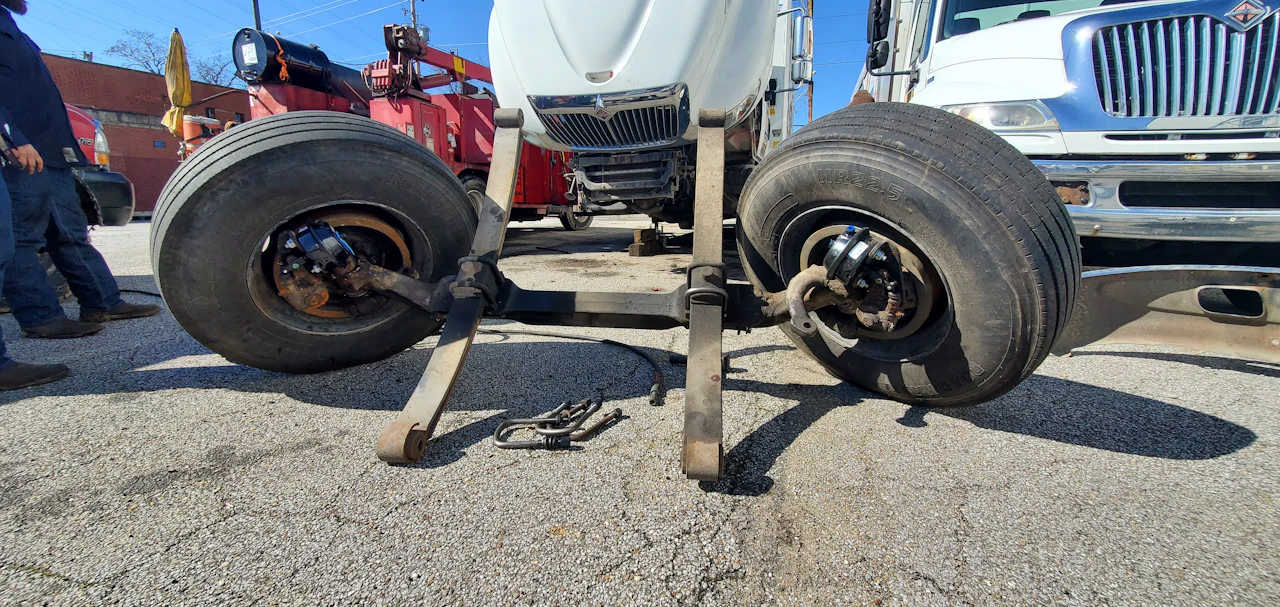Why Are Trailer Axle Repairs Crucial for Long-Haul Safety?
Neglecting trailer axle repairs can lead to uneven loads, tire blowouts, and brake failure—major hazards on long hauls. This article explores why axle maintenance is vital for safety, performance, and DOT compliance on every mile of the road.
Dedicated to top-notch customer care.


Why Are Trailer Axle Repairs Crucial for Long-Haul Safety?
From the steel giants of I-95 to the weather-beaten backroads of New England, long-haul trucking is a test of machinery and willpower. At the very heart of that test? Trailer axles—those underappreciated workhorses that bear the load, take the beating, and (if neglected) can bring a 40-ton rig to a screeching halt. Let’s dive into why trailer axle repairs aren’t just a maintenance checklist item, but a lifeline for long-haul safety.
What Is The Purpose Of Trailer Axles?
Weight Distribution and Load Bearing
Your trailer axles aren’t just rotating shafts—they’re structural keystones. These cylindrical components carry the brunt of the load, evenly distributing tens of thousands of pounds across your trailer’s frame and wheels. If you’re hauling a full load of dry goods from Cumberland, RI to Chicago, those axles are doing the heavy lifting.
But here’s the kicker—any slight misalignment or damage can lead to uneven load distribution, overworked suspension, and tire blowouts. That’s not just bad for your wallet—it’s dangerous.
Steering Stability and Tracking
Most folks don’t associate axles with steering, but they should. Especially in multi-axle setups like tandem trailers, proper axle alignment determines how true your trailer tracks behind the cab. Misaligned axles can cause:
- Sway and fishtailing at high speeds
- Excessive tire wear on the inner or outer tread
- Drag that kills your fuel economy
The Impact of Misaligned Axles on Fleet Performance
Misaligned trailer axles accelerate tire wear, leading to more frequent replacements and higher maintenance costs. They also increase rolling resistance, which hurts fuel efficiency and drives up operating expenses. Your drivers will also tire more easily or just be annoyed with correcting the wheel. Misalignment strains suspension components, causing premature wear and unplanned downtime. Left unaddressed, these issues reduce fleet reliability and disrupt delivery schedules.
How to Spot Axle Issues Before They Worsen
Uneven Tire Wear
If one side of your tires looks like it’s been through a cheese grater while the other side looks brand new, your axle alignment is probably out of whack. This could be due to worn-out bearings, bent axles, or damaged spindles.
Noises and Vibration
Hear that grinding, humming, or clunking sound? That could be a failing wheel bearing or a welded spindle, especially if it’s accompanied by vibration at highway speeds. Left unchecked, this can lead to catastrophic bearing failure, sometimes enough to cause the entire wheel-end assembly to break loose.
Heat and Smoke
If your wheel hubs feel hot to the touch or you see smoke puffing out of the axle area, you’ve likely got a lubrication issue or a bearing meltdown. These parts must be greased and torqued to spec—failure to do so risks not just your trailer, but the lives around it.
Increase Fleet Safety With Axle Maintenance
The Role of Preventive Maintenance
According to industry best practices, preventive maintenance is your best insurance policy. Trailer axle care is federally regulated. Failing one could mean red-tagging your rig.
Regular axle inspections should include:
- Checking and replacing bearing grease
- Inspecting for bent or cracked axle shafts
- Measuring for correct toe-in and camber angles
- Torque checks on u-bolts and spring mounts
Downtime Is More Expensive Than Repairs
You can decide to spend a little now or a whole lot later by scheduling trailer axle service, and the choice is obvious. Let’s break it down—missing one delivery due to an axle failure can cost you:
- Lost revenue
- Towing and emergency repair bills
- Damaged cargo claims
- A hit to your CSA score
Don’t Ignore the Extras—Supporting Components Matter
Suspension Systems: Most trailers use leaf spring or air ride suspension setups that interface directly with your axles. Cracked leaf springs or leaking airbags can offset your load distribution, putting extra stress on the axle and wheel ends.
Brake Assembly Wear: Since most trailer brakes are air-drum systems, your S-cams, slack adjusters, and brake shoes are mounted on the axle housing. Damage here can compromise both your braking and axle health. For instance, a broken cam bracket can warp your axle over time.
Axles Provide Long-Haul Safety
If the engine is the heart, then the trailer axle is the spine. It holds the rig steady, bears the weight, and keeps your wheels moving true. Neglect it, and you're flirting with danger at 70 mph. So next time you're in for a PM or DOT inspection, don’t just skim over the axles—give them the full spotlight.
Need a trailer axle inspection in Cumberland, RI? Let S&D Auto & Truck get you road-ready. Book your service today. For more information, read our article on truck preventive maintenance.
.webp)